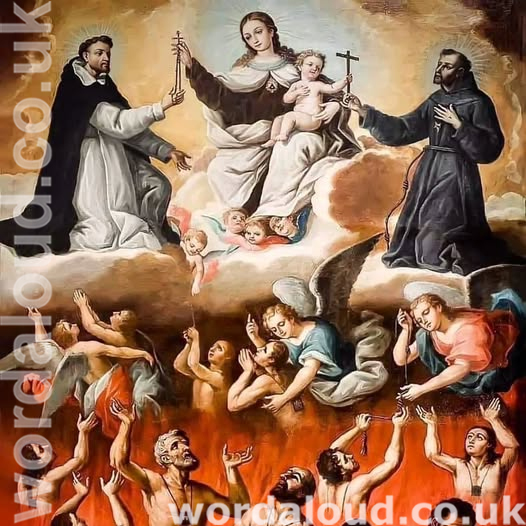Christian Art | Jesus Christ The Risen Lord Meets His Disciples | Saint Peter Swims To Jesus
Office Of Readings | Week 17, Saturday, Ordinary Time | A Reading From The Letter Of Saint Ignatius Of Antioch To Polycarp | Avoid Evil Practices | Love Jesus Christ | The Christian Is Not His Own, His Time Belongs To God
‘The honour of God should be the aim in everything.’
Saint Ignatius, Bishop of Antioch, was being transported to Rome under guard to face execution in the Coliseum, likely in the early second century. His letters, written on the way, reflect both his apostolic zeal and a deep concern for the life of the Church in its earliest decades. His correspondent, Saint Polycarp, bishop of Smyrna, was himself a revered figure, a disciple of Saint John the Apostle, and later a martyr. Thus, this is a remarkable exchange: from one soon-to-be martyr to another, entrusted with the care of the flock in perilous times.
Ignatius’s guidance to Polycarp is deeply rooted in both Scripture and apostolic tradition. His primary concern is that all things be done ‘for God’s honour’. This is no mere platitude—it is a principle that governs marriage, ecclesial order, moral behaviour, and the structure of Christian life. His instruction is holistic: concerned equally with the personal virtue of individuals and the broader unity and harmony of the Church.
The Christian Household | Love, Chastity And Humility
Ignatius begins with practical ethical advice: exhorting Christian spouses to be faithful in both body and spirit, and urging those who choose celibacy not to boast in their state. This mirrors Saint Paul’s teachings in Ephesians 5, where marriage is seen as an image of Christ’s love for the Church. Chastity, whether in marriage or in celibacy, must be offered humbly and for God—not used to exalt oneself above others.
The emphasis on not boasting, especially over spiritual achievements, highlights an enduring Christian truth: virtue, when paraded, ceases to be virtuous. The warning against thinking oneself ‘better than the bishop’ reflects Ignatius’s high ecclesiology—his belief that the bishop is the visible sign of unity in the Church, and must be respected as Christ’s representative in the community.
Spirituality Of Unity And The Image Of The Church As An Army
A major theme of Ignatius’s entire body of letters is unity. Here, he calls for a harmony of purpose among Christians: ‘Work together in harmony: struggle together, run together, suffer together, rest together, rise together.’ This is a vision of the Church not as a collection of individuals but as a spiritual organism, bound in mutual love and obedience, walking the same path to God.
He employs military imagery—Christians are ‘soldiers’ who must not desert their post. Baptism is our armour, faith our helmet, love our spear, and patience our full protection. These metaphors recall Paul’s letter to the Ephesians (6:10–17) and were particularly apt in an era when Christians were harassed and persecuted by imperial authorities. Yet Ignatius is not urging violence or militancy; rather, he is calling for endurance, perseverance, and discipline—the hallmarks of true discipleship.
Apostolic Authority And Practical Church Life
Ignatius’s ecclesiology is strikingly mature for the early second century. He clearly affirms the hierarchical structure of bishop, presbyters, and deacons, and urges that nothing be done without the bishop’s approval. This early witness is a significant affirmation of the apostolic succession and the Church’s developing understanding of authority and governance.
Even practical matters—such as the appointment of messengers, correspondence between churches, and support for Christian slaves—are addressed with care. The request for Polycarp to convene a council and appoint a courier to Antioch reflects the embryonic but clear sense of Catholicity—that the Church, though geographically scattered, is united in love, doctrine, and mutual support.
Ignatius’s phrase ‘A Christian is not his own master: his time is God’s’ could serve as a spiritual motto. It reminds us that our lives, time, and choices belong to the Lord who redeemed us. The emphasis on using time well for the advancement of God’s glory calls to mind Paul’s exhortation in Ephesians 5:16 to ‘make the most of the time, because the days are evil’.

A Reading From The Letter Of Saint Ignatius Of Antioch To Polycarp | Avoid Evil Practices | Love Jesus Christ | The Christian Is Not His Own, His Time Belongs To God
Avoid evil practices: indeed, preach against them. Tell my sisters to love the Lord and be content with their husbands in the flesh and in the spirit, and in the same way bid my brothers in Christ’s name to love their wives as the Lord loves his Church. If anyone can remain chaste in honour of the Saviour’s flesh, then let him do so without boasting. For if he boasts of it, he is lost; and if he thinks himself for this reason better than the bishop, he is lost. Those who marry should be united with the bishop’s approval, so that the marriage may follow God’s will and not merely the prompting of the flesh. Let everything be done for God’s honour.
Hear your bishop, that God may hear you. My life is a sacrifice for those who are obedient to the bishop, the presbyters and the deacons; and may it be my lot to share with them in God. Work together in harmony: struggle together, run together, suffer together, rest together, rise together, as stewards, advisors and servants of God. Seek to please him whose soldiers you are and from whom you draw your pay; let none of you prove a deserter. Let your baptism be your armour, your faith your helmet, your charity your spear, your patience your panoply. Let your good works be your deposits, so that you may draw out well-earned savings. So be patient and gentle with one another, as God is with you. May I have joy in you for ever!
Since I have heard that the church of Antioch in Syria is in peace through your prayers, I too am more tranquil in my reliance upon God. If only I may find my way to God through my passion and at the resurrection prove to be your disciple! My most blessed Polycarp, you should convene a godly council and appoint someone whom you consider dear and especially diligent to be called God’s courier and to have the honour of going into Syria and advancing God’s glory by speaking of your untiring charity. A Christian is not his own master: his time is God’s. This is God’s work, and it will be yours as well when you have performed it. I have trust in the grace of God that you are ready to act generously when it comes to God’s work. Since I knew so well your zeal for truth, I have limited my appeal to these few words.
I could not write to all the churches because I am sailing at once from Troas to Neapolis, as is required of me. I want you, therefore, as one who knows God’s purpose, to write to the churches of the East and bid them to follow the same procedure. Those who can should send representatives, while the rest should send letters through the messengers you have sent. Thus your community will be honoured for a good work of eternal value, as you yourself deserve.
I wish all of you well for ever in Jesus Christ; through him may you all remain in God’s unity and in his care. Farewell in the Lord!
Christian Prayer With Jesus Christ
Lord God,
You called your servant Ignatius of Antioch to bear witness to Christ even unto death, and to shepherd your people with wisdom and courage.
Grant that we, inspired by his words and his martyrdom, may live not for ourselves but for your glory.
Teach us to honour one another in humility, to serve your Church in unity, and to use the time given to us for the work of your Kingdom.
Clothe us with the armour of light:
With faith as our shield, love as our spear, patience as our strength,
That we may, like Ignatius, run the race of endurance and win the crown of eternal life.
Through Jesus Christ our Lord,
Who lives and reigns with you and the Holy Spirit, one God, now and forever. Amen.
Glossary Of Christian Terms
Antioch – An ancient city in modern-day Turkey and an early centre of Christianity. Ignatius was its bishop and a key link between the apostles and the next generation of Church leaders.
Bishop – A successor of the apostles, entrusted with overseeing the spiritual and pastoral care of a diocese or Church. Ignatius strongly emphasised the importance of unity under the bishop.
Celibacy – A commitment to abstain from marriage and sexual relationships for the sake of the Kingdom. Ignatius valued celibacy when done humbly and not as a cause for pride.
Ecclesiology – The theological study of the Church’s nature, structure, and mission. Ignatius’s letters are an early and important source for the development of Catholic ecclesiology.
Faith, Charity, Patience (as armour) – Imagery drawn from Saint Paul’s letters, especially Ephesians 6. Ignatius uses the metaphor of a Christian soldier spiritually armed for endurance and unity.
Heresy – A belief or teaching contrary to the orthodox faith of the Church. Ignatius warns against those who seem trustworthy but distort the true doctrine of Christ.
Martyr – From the Greek martys, meaning ‘witness.’ A martyr is someone who suffers death for their faith. Ignatius anticipated and embraced martyrdom as a way to follow Christ completely.
Polycarp – Bishop of Smyrna, friend and correspondent of Ignatius, and himself a martyr. He represents the continuity of the apostolic tradition.
Presbyter – An elder or priest in the early Church, subordinate to the bishop. Alongside deacons, presbyters helped to govern and minister to local Christian communities.
Unity – A central theme in Ignatius’s writings. He saw unity in faith, worship, and obedience to the bishop as vital signs of the Church’s health and holiness.








